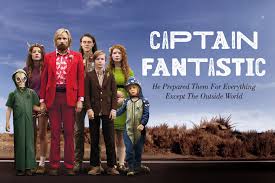Captain Fantastic

Zooming through the fast-paced lifestyle so many DC dwellers live today, it is not uncommon to discuss (in therapy or elsewhere) the desire to step away from it all and check out. Captain Fantastic paints a cinematic portrait of a passionate, deliberate life off the grid in the Pacific Northwest. Viggo Mortensen is utterly convincing as Ben, the father and family captain who leads his six children as if they are foot soldiers training for physical and intellectual battle. This engaging and endearing film written and directed by Matt Ross (of Silicon Valley) is one that parents and teenagers can view together and enjoy. The film has the potential to generate open, engaged and substantive discussions with teenagers about parenting, education, values, sex and relationships.
When Ben must leave the isolated cocoon of the wilderness, his parenting is tested. It becomes clear that his greatest strengths as a father are also connected to several of his limitations and foibles. Interestingly, this is a common theme in psychotherapy. Sometimes the most effective way to make a change or address a problem involves facing the ways that the problem relates to both weaknesses and strengths. Ben’s children are brilliant, engaging, authentic and physically and mentally astonishing. Nevertheless, the pure and intense drive to protect and perfect his family is ultimately intertwined with an extreme degree of isolation and excessive expectations that sometimes go too far. As his children come of age, Ben too, must come of age as a parent.
It may seem counter-intuitive, but authentic growth and change often involves admitting when certain personal strengths have gone too far and therefore cross a line. This aspect of Captain Fantastic’s plot trajectory makes psychological sense. To save his family, Ben does not and should not change the intensity and quirky idealism that makes him a special father with a beautiful family. Rather, he needs to turn down the volume and scale back the intensity of his approach.
Parents who are engaged with their families often notice that a teenager’s coming of age rocks the family system and thereby shakes a marriage. For families immersed in this complex and quintessential chapter of family life, this film is worthwhile viewing for adults and teenagers together. A final ceremony near the film’s conclusion is somewhat off-putting; nevertheless, the film is as special as it is inspiring.
